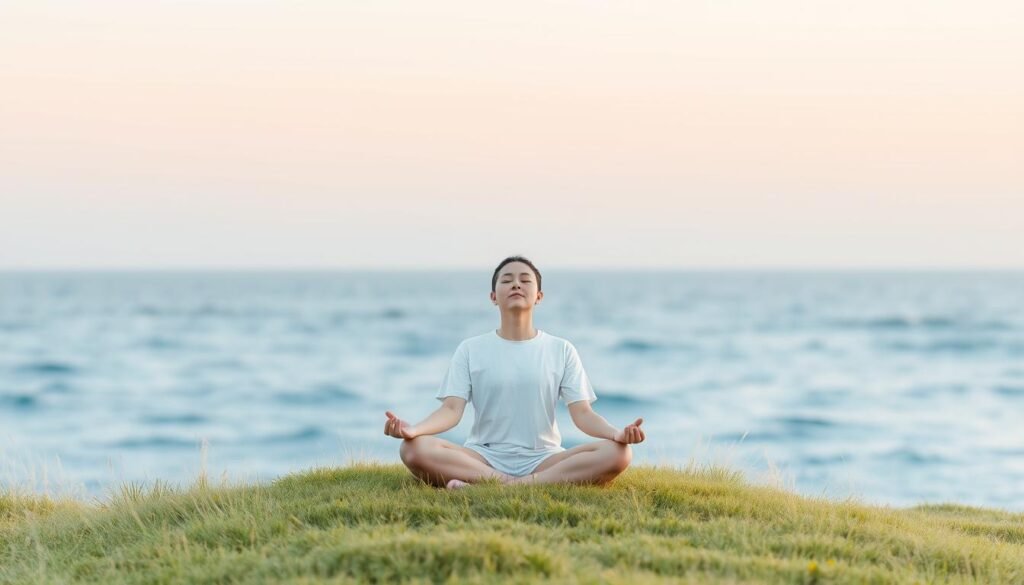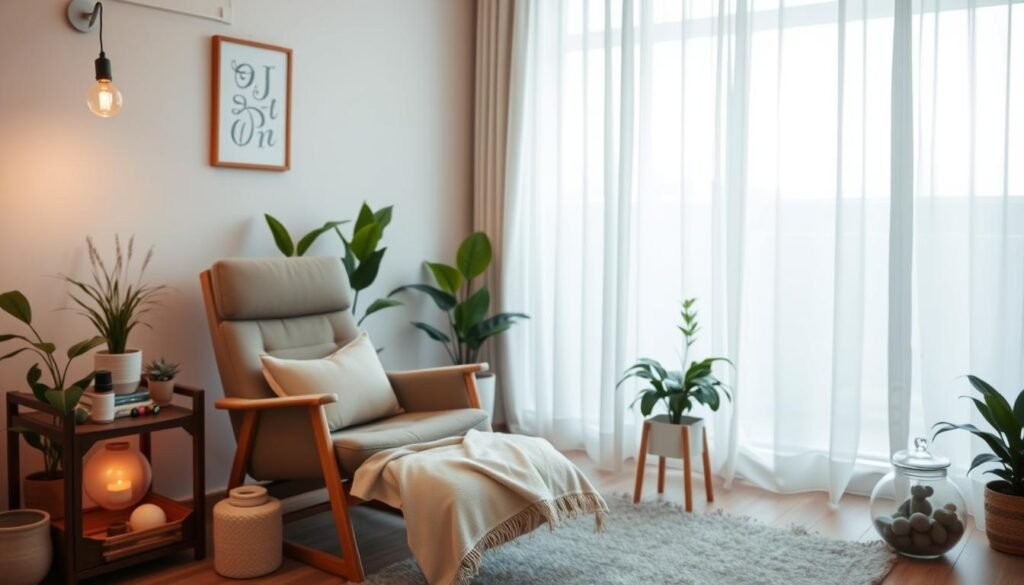Did you know anxiety affects over 40 million adults in the U.S. every year? That’s more than 18 percent of the population. One lesser-known symptom of anxiety is dizziness. Many people ask: does anxiety make you dizzy?
This sensation often comes with other signs of anxiety, causing confusion about the cause. It’s important to tell apart dizziness from anxiety and from other health issues because it changes how one might treat it. Understanding this link is key, especially for those feeling dizzy due to anxiety and other worrying signs.
Key Takeaways
- Anxiety disorders affect over 40 million adults annually in the U.S.
- Dizziness is a common symptom associated with both anxiety and vestibular disorders.
- It’s essential to distinguish between dizziness caused by anxiety and other physical conditions.
- Professional help is crucial for managing symptoms of anxiety and dizziness.
- Strategies for managing anxiety dizziness include relaxation techniques and lifestyle adjustments.
The Link Between Anxiety and Dizziness
Anxiety can cause many physical symptoms, including dizziness. It’s often linked with *dizziness* from anxiety disorders. This dizziness can happen when you’re very anxious or stressed over time. Breaking free from this cycle can be tough.
People with anxiety might feel lightheaded or like they’re going to faint. This so-called stress dizziness is very upsetting. Research suggests a connection between emotional stress and fainting, known as vasovagal syncope. This is important for those with anxiety who might also faint.
Different anxiety disorders show different symptoms. Someone with panic disorder may feel extremely dizzy during a panic attack. Generalized anxiety disorder can cause ongoing nervousness and dizziness. Also, anxiety can make people more likely to experience certain kinds of vertigo.
To handle these symptoms, a mix of treatments is often needed. Drugs like selective serotonin reuptake inhibitors and beta-blockers help. Making changes to your lifestyle, such as exercising and staying hydrated, is also key. Practicing breathing techniques can also help stop dizziness caused by hyperventilation in stressful moments.
Paying attention to what triggers your dizziness is useful. Avoiding caffeine and alcohol can prevent it. Using coping methods, like compression stockings for blood pressure issues, helps during anxiety attacks. If dizziness is a constant problem or gets worse with new medicine, seeking professional help is a smart move.
What is Dizziness?
Dizziness is a broad term covering several sensations. These include lightheadedness, vertigo, and a general unsteadiness. Many adults see doctors about it. It can come from various problems, like inner ear issues, bad circulation, or medication side effects.
Lightheadedness often feels like you might faint. Vertigo makes you feel like you’re spinning. It’s mainly due to inner ear problems. Benign paroxysmal positional vertigo (BPPV) is a common vertigo cause. It happens with changes in how your head is positioned. Viral infections and migraines can also make you dizzy.
Meniere’s disease is a rare but serious condition. It involves fluid in the inner ear, causing vertigo and hearing loss. Older adults often get dizzy from health issues and medications. If you’ve been dizzy before, it might happen more often, getting worse if not treated.
Anxiety can make dizziness worse. Stress changes your body, leading to lightheadedness or vertigo. Understanding this link helps in treating dizziness and related problems.
- Common causes of dizziness include:
- Poor circulation
- Inner ear disorders
- Medication side effects
- Low blood pressure
- Dehydration
- Physical implications of dizziness can lead to:
- Increased risk of falls
- Accidents while driving
- Long-term health issues if untreated
- About 30% of individuals experience dizziness in connection with migraines.
Understanding dizziness’s complex nature is key to effective treatment. This is especially true for anxiety-related dizziness. Knowing different causes helps people manage their health and get help when needed.
Understanding Anxiety Symptoms
Anxiety shows up in many ways, affecting daily life. It brings physical signs like a quick heartbeat, trouble breathing, and panic. These can pop up suddenly, especially in stressful times, leading to intense fear or dread.
People with anxiety often feel physical pain, including headaches and stomach issues. A usual symptom is dizziness, happening during panic attacks. This feeling might last from a few minutes to half an hour, making unease worse.
Long-term anxiety, like GAD, means less severe but constant dizziness. Dehydration or not enough sleep can make this worse. Too much caffeine also ups heart rate, making panic and discomfort stronger. It might even cause your heart to race during anxious moments.
Anxiety and dizziness relate to mental health and how we live. Good self-care, like drinking water, eating well, and exercising, helps lessen these hard feelings. Getting help from a professional is also key in dealing with anxiety.
| Symptom | Description |
|---|---|
| Rapid Heart Rate | Increased heart rate can trigger sensations of panic, particularly in stressful situations. |
| Panic Attacks | Sudden bouts of intense fear leading to physical symptoms like dizziness and shortness of breath. |
| Dizziness | Can occur acutely during panic attacks or as part of chronic anxiety, potentially lasting hours. |
| Others | Physical discomforts include headaches, gastrointestinal issues, and feelings of unreality. |
Does Anxiety Make You Dizzy?
Anxiety disorders cause many physical symptoms. Dizziness is one common effect. Knowing how anxiety and dizziness are linked helps understand vertigo anxiety and lightheadedness caused by anxiety.
Common Sensations Associated with Anxiety Dizziness
Anxiety leads to feelings of dizziness in different ways. People often feel:
- Lightheadedness: This means feeling like you might faint during moments of high anxiety.
- Wooziness: It feels like everything around you is spinning.
- Trembling or shaking: Feeling unsteady due to muscle tension.
- Nausea: Anxiety can also make your stomach upset or make you feel nauseous.
How Dizziness and Anxiety Interact
The link between dizziness and anxiety is not simple. Anxiety can cause you to breathe too fast. This reduces carbon dioxide in your blood, leading to:
- Mental confusion
- Weakness in limbs
- Feeling more lightheaded
Dizziness can then make anxiety worse, creating a cycle of distress. Panic attacks bring on sudden, intense anxiety with dizziness. The fear of falling or losing control makes it scarier.

To manage this, it helps to use controlled breathing and grounding techniques. These methods help calm both anxiety and dizziness.
| Sensation | Description |
|---|---|
| Lightheadedness | Feeling faint or unsteady. |
| Wooziness | The sensation of the environment spinning. |
| Trembling | Muscle tension leading to instability. |
| Nausea | Stomach discomfort associated with anxiety. |
Physical Responses to Anxiety That Cause Dizziness
Anxiety can lead to many physical responses, including dizziness. For many, this dizziness comes from sudden panic attacks and quick breathing. This makes the blood’s carbon dioxide levels drop, making you feel lightheaded.
Stress throws your body into fight-or-flight mode, releasing adrenaline. This rush can make you feel more anxious and dizzy. Muscle tension, headaches, and fatigue from anxiety can also make you feel dizzy.
Conditions like generalized anxiety disorder (GAD) and panic disorder show how anxiety affects us physically. Dizziness often comes with heart racing and breathing fast. It’s critical to see the link between them. Getting help from experts and using tips from anxiety management resources can lessen dizziness caused by anxiety.
Knowing what triggers your anxiety can help you control it. Relaxation methods, like meditation and deep breathing, can calm these symptoms. If you often feel dizzy, it’s important to talk to a doctor, as it could point to other health problems. Making supportive friends and living healthily can greatly enhance your life.
| Physical Response | Effect on Dizziness |
|---|---|
| Rapid Breathing | Decreases carbon dioxide, causing lightheadedness |
| Adrenaline Release | Triggers fight-or-flight response, leading to unsteadiness |
| Muscle Tension | Causes discomfort, which may contribute to feelings of dizziness |
| Dehydration | Can exacerbate dizziness and lightheadedness |
| Circulation Changes | Alters blood flow to the brain, contributing to dizziness |
The Role of the Vestibular System
The vestibular system is key for balance and knowing where we are in space. It includes parts in our inner ear, like the semicircular canals and otolith organs. They sense movement and head position changes. This system tells our brain where our body stands in relation to gravity. This info helps us move smoothly and stay steady.
Feeling anxious can mess with this system, causing us to feel dizzy and off-balance. This is especially true during a strong anxiety attack. Our bodies respond by speeding up our heart and making us breathe faster. This can make the vestibular system work poorly, which makes us feel even more unsteady.
Anxiety can make it tough to get better from balance problems, like vestibular dysfunction. People with anxiety struggle more with balance, which complicates treatment. But, help from vestibular therapists can tackle both the anxiety and balance issues effectively.
Knowing how the vestibular system and anxiety are linked helps us understand why anxiety often leads to dizziness. They work together closely, so treating both is crucial. Treatments that include thinking strategies, relaxing methods, and balance exercises can really help those with balance challenges.
Inner Ear Disorders and Anxiety
Knowing how inner ear disorders and anxiety link can help those feeling dizzy. These disorders show up with symptoms that might make your anxiety worse. Learning about these issues can lead to better symptom control.
Vestibular Disorders Overview
Many vestibular disorders can make you feel dizzy and more anxious. Conditions like BPPV, vestibular neuritis, and Meniere’s disease are common. Each one has its own signs:
| Vestibular Disorder | Description | Common Symptoms |
|---|---|---|
| BPPV | Most common cause of vertigo, resulting from dislodged calcium crystals. | Short episodes of spinning sensations, especially with head movements. |
| Vestibular Neuritis | Inflammation of the vestibular nerve, often following a viral infection. | Sudden vertigo, balance issues, and possible nausea. |
| Meniere’s Disease | A rare disorder causing episodes of vertigo, tinnitus, and hearing loss. | Severe vertigo, imbalance, and fluctuating hearing loss. |
| Vestibular Migraine | Associated with migraine headaches, causing dizziness and motion sensitivity. | Dizziness, light sensitivity, and usual migraine symptoms. |
BPPV and Its Connection to Anxiety
BPPV strongly links to anxiety disorders. Studies show that anxious people are more likely to get BPPV. BPPV can make you scared of falling or losing balance, which increases your anxiety. People with these issues often feel lost and worried, causing anxiety and dizziness to feed into each other.
Finding out more and talking to a doctor can help. Many find their anxiety drops when they understand their vestibular disorder. Treating both the mental and physical parts of these conditions leads to better management.
Managing Anxiety-Related Dizziness
Anxiety can make you feel dizzy, and it can disrupt your daily life. Knowing how to deal with this dizziness is key. It helps to manage the anxiety causing it.

- Breathing Exercises: Slowing down your breath can calm you, helping to reduce dizziness.
- Hydration: Drinking water helps, especially since not having enough fluids can make you dizzy when anxious.
- Visual Focusing: Looking at something steady can help you feel more stable.
- Resting: Sometimes, closing your eyes and resting is the best way to feel better.
A study in Germany involving 1,287 people found that 15.8% experienced dizziness. More than a quarter also had anxiety signs. This shows a link between anxiety and feeling dizzy.
Dizziness from anxiety usually doesn’t last long. It gets better after the anxious moment passes. Using the mentioned techniques can help it go away faster. Dizziness and anxiety often trigger each other.
These strategies can greatly improve life for those dealing with anxiety-induced dizziness. It shows how tackling both the mind and body is vital for relief.
When to Seek Professional Help
Feeling dizzy all the time can really mess up your day-to-day life. If you’re also anxious, it’s a good idea to get help from a pro. Knowing when to talk to a doctor is key, especially if dizziness stops you from doing normal stuff or gets really bad.
Dizziness can start from being super anxious, a rush of adrenaline, or too much stress hormone, cortisol. This can make you feel like you’re spinning. It might last just a few seconds for some. But for others, it lasts longer. If dizziness doesn’t go away, it could mean there’s a health problem needing a doctor’s care.
If you get dizzy a lot or if it happens with other signs like a fast heart or trouble focusing, see a doctor for your anxiety. They’ll look at what’s stressing you out. This might be stress from work or problems in relationships.
Sometimes, feeling too wound up or too down because of anxiety might cause dizziness. Getting help like cognitive behavioral therapy (CBT) can really support you. It’s important to look after both your mind and body to get better.
If you need help right now, you can call a mental health helpline like 111. Knowing there are treatments that work can give people with anxiety and dizziness hope for feeling better.
Treatment Options for Anxiety and Dizziness
There are many ways to handle anxiety and its connected dizziness. People can combine different therapies, medications, and lifestyle changes. This mix helps create a custom plan that fits their unique situations.
Therapies and Medications
There are special anxiety treatments that also help with dizziness. Cognitive Behavioral Therapy (CBT) is one. It teaches people to understand and change their negative thoughts. For physical issues, vestibular rehabilitation helps. It uses exercises to improve balance and lessen dizziness.
Medications depend on what the person needs. Some may take antihistamines for dizziness or anti-anxiety drugs like Diazepam and Xanax. There are also medicines for those whose dizziness comes from migraines. In tough cases, doctors might suggest surgery.
Lifestyle Changes for Management
Making certain lifestyle changes can really help. Doing regular exercise lowers anxiety. Staying hydrated is key because lack of water makes dizziness worse. Learning to breathe in a controlled way can stop dizziness tied to anxiety.
Other good steps include:
- Staying away from caffeine and alcohol since they can make anxiety spike.
- Taking it easy in a cool, calm place if dizziness hits.
- Trying out relaxation methods like meditation or yoga.
- Keeping the home safe to avoid falls from dizziness.
Managing well means combining dizziness therapies and active changes in lifestyle. This strategy helps people tackle the challenges of anxiety and dizziness effectively.

Conclusion
It’s crucial to understand how anxiety and dizziness affect each other. Knowing this can help people who suffer from them. About 28% of people with dizziness also have an anxiety disorder. This shows how common these issues are together.
Benign Peripheral Persistent Vertigo (BPPV) often happens to those who are anxious. Chronic Subjective Dizziness (CSD) is also seen a lot in people with anxiety. This highlights the importance of being aware and managing such conditions.
Effective ways to manage can really improve life quality for those with anxiety-related dizziness. The key takeaways are seeking professional advice and making positive lifestyle changes. People should feel able to control their health and find ways to support their mental wellness.